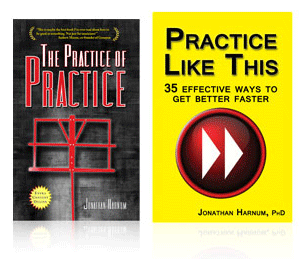Try to put well into practice what you already know. In so doing, you will, in good time, discover the hidden things you now inquire about.
—Remy de Gourmont (French novelist/poet/playwright/philosopher, 1858-1915)
________________
It seems that I tend to write and think about abstract notions of practice and discipline and motivation and these don’t easily translate into practical advice, something that can be applied, and simply. So here’s something, and only a smattering of research to back up what I’m saying, I promise.
By studying how the brain learns most efficiently and combining this information with the study of actual practice habits, we can see that people who have become very good at what they do have learned to practice throughout the day. A good substantial chunk of time in the mid to late morning (if you are so lucky/intentional to have the time free), but also other periods during the day. This might be an early morning warm-up, a practice I find particularly useful with trumpet and other brass instruments. Nothing special, maybe 10-15 minutes of getting the air moving and connecting the air and other mechanics of playing trumpet to the music of it, that ineffable thing that transcends technique. And little flurries of music later in the day, too. A quick performance of a tune, or the re-visit of a tricksy passage or melody or concept. This frequent reinforcement and learning are what the brain likes. Longer periods of intense concentration are necessary, but so is rest, and so are brief periods of intense concentration. And more rest.
So, there’s no need to kill yourself in one long practice session, and in fact, this is counterproductive and could lead to burnout. The average time spent in intense practice per day (not all in one shot, need I remind us), among experts across disciplines, was four hours. The thinking behind why there are limits to intense periods of practice is that over long spans of time, this is the most efficient way to push ability and sustain that kind of intense effort. The magic number to grow steadily without being stretched beyond what is healthy. This adds up over 10 yrs to around 10K hours of time, the amount of practice that appears necessary to make a significant contribution to a given field.
Now you, like me, may not have the desire to make a significant contribution to the field, but just want to get better. That’s the great thing. These techniques work no matter what your goals are. Of course, I’m assuming your goal is not to get worse. In that case, nevermind. My own goals are to enjoy myself and to get better, however slowly, however gradually. It’s worked pretty well over the last 31 years (hear it for yourself here).
So, one of the ways in which I help facilitate this “extra” practice is to leave my instruments out and pretty easily available. Ready to hand. Then I can toss off an exercise, a tune, a troubling passage in a piece I’m working on, some free improvising just for kicks (maybe in a difficult key or mode), or for more structured improvising I’ll loop a chord progression/rhythm with my guitar and then play over the top of it on trumpet. If I had to unpack and set up everything, this would happen only rarely. But when all I have to do is plug in and turn on, or simply pick up the horn and blow, it happens throughout the day. I even manage to get other work done, like blog-writing.
There is, however, one hazard to leaving out your instruments. Sometimes it can be so fun and rewarding to insert a little music-making into the day that the time spent music-making can balloon to “unproductive” length. This tends to happen to me if I haven’t spent that good 2-4 hour chunk of more intentional practice earlier in the day. Heck, even a solid half-hour is great earlier in the day. Every little bit helps.
Hope this post is practical enough to make a difference in your own practice, and that it contributes to your own growing expertise. Get yourself a guitar stand, an instrument stand, or whatever (a dust cover is a good idea, too), so your instrument is right there whenever you have ten minutes to spare. Keep at it! Passion and perseverance are more important than “talent.”
